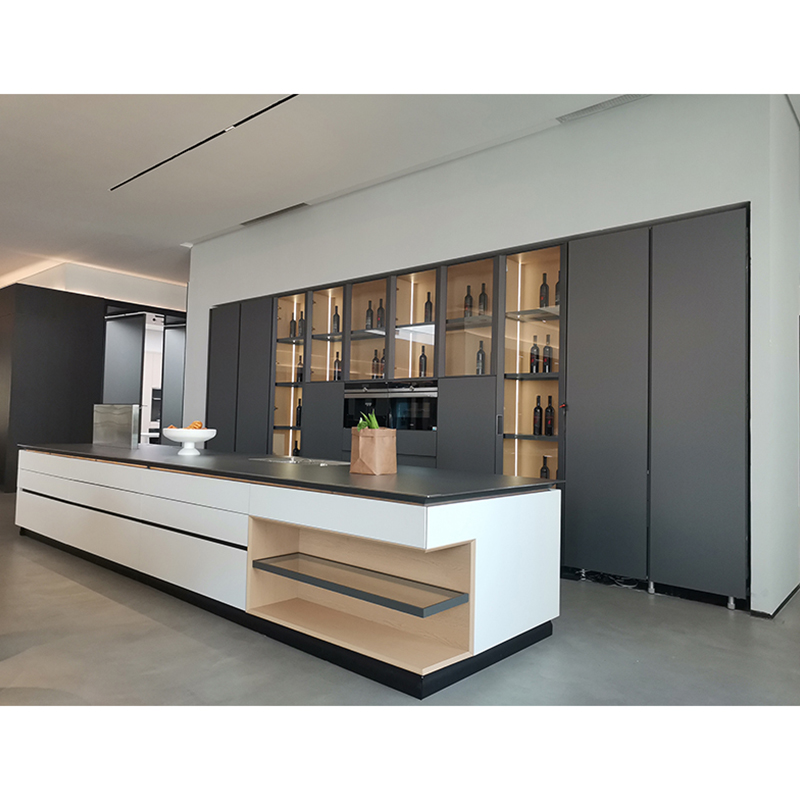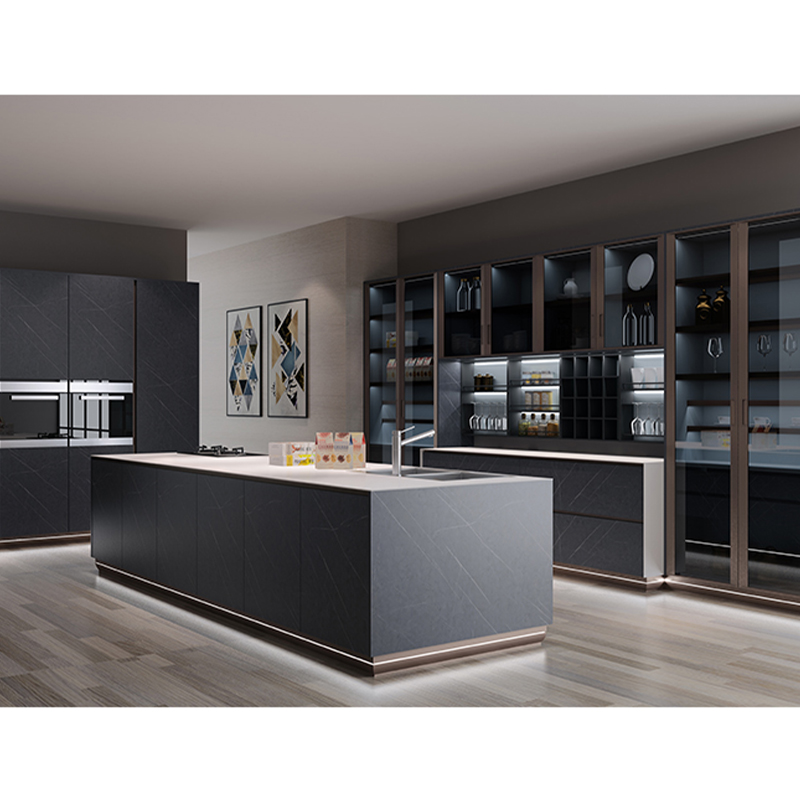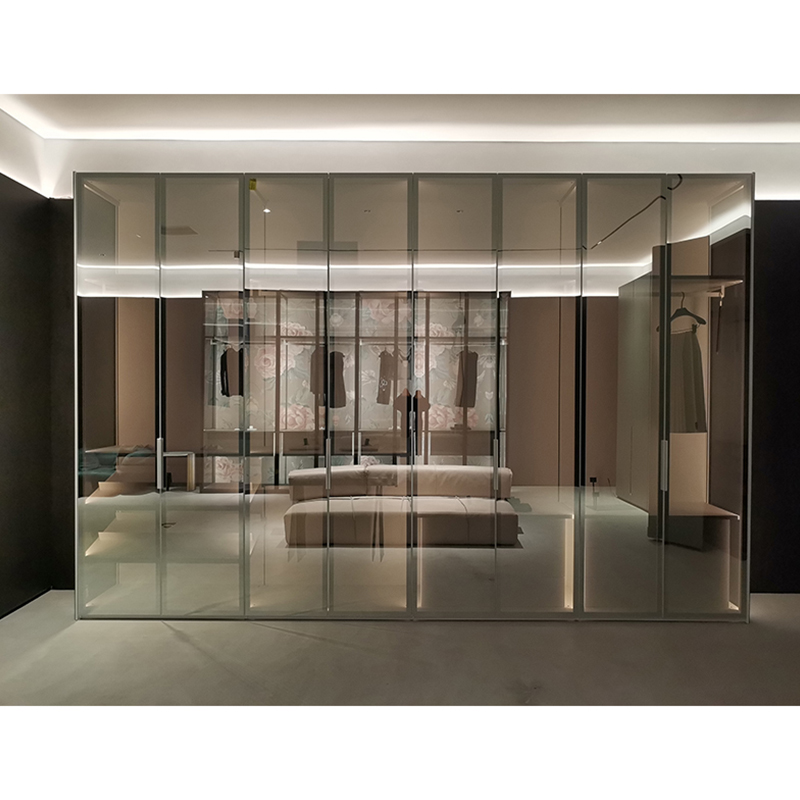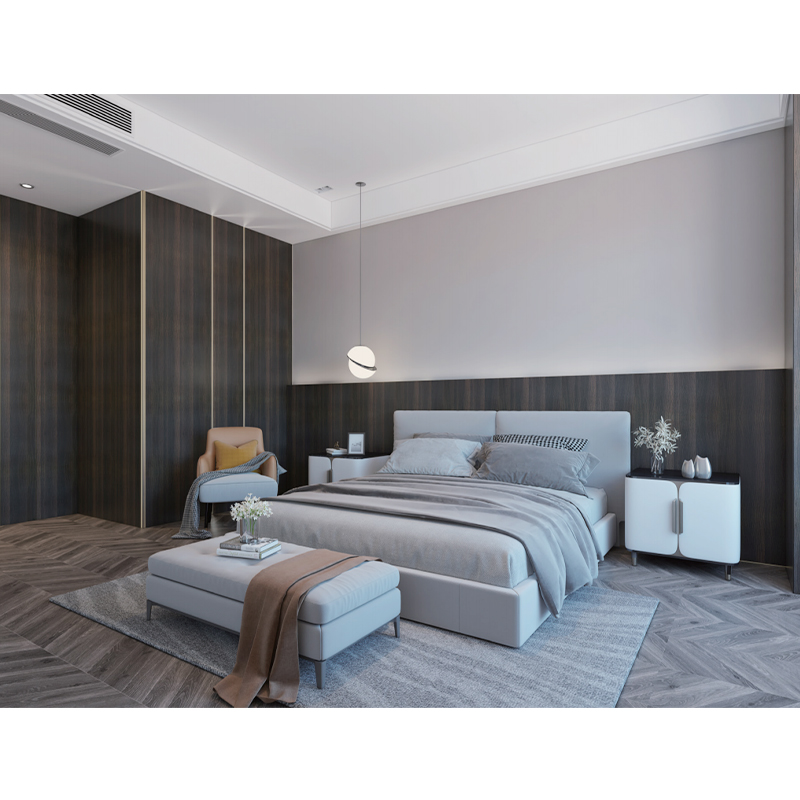Does an aluminum alloy frame enhance the structural stability and overall safety of an aluminum frame glass door kitchen cabinet?
Release Time : 2025-10-03
In modern kitchen design, glass door cabinets are increasingly favored in high-end residential and contemporary style spaces due to their transparent, lightweight aesthetic and ease of cleaning. However, glass, being a brittle material with limited impact resistance, can easily become loose, deformed, or even fall off under frequent opening and closing or due to temperature and humidity fluctuations, compromising safety and lifespan. The aluminum frame glass door kitchen cabinet addresses this key issue. The **aluminum alloy frame**, as the core component for connecting and supporting the glass, provides superior structural stability and significantly enhances overall safety, achieving a perfect balance between aesthetics and functionality.
The aluminum alloy frame, through precise profile design and manufacturing processes, securely embeds the glass within the metal frame, forming a robust "frame-panel" structure. Unlike traditional glued or point-supported glass doors, the aluminum frame uses mechanical clamping or snap-fit technology, completely encasing the glass with high-strength metal. This effectively distributes external forces, preventing stress concentration at the edges or center of the glass. This all-around fixing method greatly increases the overall rigidity of the cabinet door, ensuring stability even with frequent opening and closing or minor impacts. This is especially important in kitchens, where temperature fluctuations and high usage rates can cause wood or plastic materials to warp, leading to poor door closure or loose hardware. Aluminum alloy, with its extremely low coefficient of thermal expansion and excellent dimensional stability, maintains structural integrity, preventing glass cracking or detachment due to frame deformation.
Furthermore, aluminum alloy offers advantages such as high strength, lightweight, and corrosion resistance. The aluminum profiles used in modern kitchen cabinets are typically made of 6063-T5 or higher grade aerospace-quality aluminum alloy, anodized or powder-coated for high surface hardness, abrasion resistance, and protection against kitchen grease, moisture, and cleaning agents. This ensures long-term durability without rust or discoloration. This material property ensures that the frame maintains its structural integrity in the humid and high-temperature environment of a kitchen, preventing corrosion from weakening its support for the glass. Furthermore, the lightweight nature of aluminum alloy reduces the overall weight of the cabinet door, lessening the load on hinges and extending the lifespan of the hardware, while also improving the smoothness and safety of door opening and closing.
In terms of safety, the aluminum frame design also incorporates a robust anti-detachment mechanism. High-quality aluminum frame glass doors typically feature a built-in locking mechanism or safety seal, providing double security: mechanically locking the glass in place and reinforcing the seal with high-strength adhesive for enhanced stability and impact resistance. Even in extreme conditions (such as earthquakes or severe vibrations), the glass will not easily detach from the frame, preventing shards from flying and causing injury. Some high-end products even use tempered or laminated glass panels, combined with the sturdy support of the aluminum frame, creating a "material + structure" double safety system, fully meeting the safety needs of homes, especially those with children or elderly residents.
Moreover, the precision manufacturing process of the aluminum alloy frame enhances the overall aesthetic appeal and quality of the cabinetry. The frame features clean, crisp lines and tight seams, complemented by UV-cured finishes or ultra-narrow edges, highlighting the transparency of the glass while maintaining a modern, metallic look. Whether paired with marble textures, solid color panels, or lighting systems, the aluminum frame seamlessly integrates, creating a sophisticated and modern kitchen atmosphere.
In summary, the aluminum alloy frame is not only the "skeleton" of the aluminum frame glass door kitchen cabinet, but also its foundation of safety and stability. Through its scientific design, high-quality materials, and precise manufacturing, it effectively prevents glass deformation, loosening, or detachment, significantly enhancing the durability and safety of the cabinet door. In modern kitchens where aesthetics and functionality are equally important, this "strength and flexibility" design retains the visual appeal of glass while compensating for its structural weaknesses, truly achieving both beauty and safety, making it an ideal choice for high-end custom cabinetry.
The aluminum alloy frame, through precise profile design and manufacturing processes, securely embeds the glass within the metal frame, forming a robust "frame-panel" structure. Unlike traditional glued or point-supported glass doors, the aluminum frame uses mechanical clamping or snap-fit technology, completely encasing the glass with high-strength metal. This effectively distributes external forces, preventing stress concentration at the edges or center of the glass. This all-around fixing method greatly increases the overall rigidity of the cabinet door, ensuring stability even with frequent opening and closing or minor impacts. This is especially important in kitchens, where temperature fluctuations and high usage rates can cause wood or plastic materials to warp, leading to poor door closure or loose hardware. Aluminum alloy, with its extremely low coefficient of thermal expansion and excellent dimensional stability, maintains structural integrity, preventing glass cracking or detachment due to frame deformation.
Furthermore, aluminum alloy offers advantages such as high strength, lightweight, and corrosion resistance. The aluminum profiles used in modern kitchen cabinets are typically made of 6063-T5 or higher grade aerospace-quality aluminum alloy, anodized or powder-coated for high surface hardness, abrasion resistance, and protection against kitchen grease, moisture, and cleaning agents. This ensures long-term durability without rust or discoloration. This material property ensures that the frame maintains its structural integrity in the humid and high-temperature environment of a kitchen, preventing corrosion from weakening its support for the glass. Furthermore, the lightweight nature of aluminum alloy reduces the overall weight of the cabinet door, lessening the load on hinges and extending the lifespan of the hardware, while also improving the smoothness and safety of door opening and closing.
In terms of safety, the aluminum frame design also incorporates a robust anti-detachment mechanism. High-quality aluminum frame glass doors typically feature a built-in locking mechanism or safety seal, providing double security: mechanically locking the glass in place and reinforcing the seal with high-strength adhesive for enhanced stability and impact resistance. Even in extreme conditions (such as earthquakes or severe vibrations), the glass will not easily detach from the frame, preventing shards from flying and causing injury. Some high-end products even use tempered or laminated glass panels, combined with the sturdy support of the aluminum frame, creating a "material + structure" double safety system, fully meeting the safety needs of homes, especially those with children or elderly residents.
Moreover, the precision manufacturing process of the aluminum alloy frame enhances the overall aesthetic appeal and quality of the cabinetry. The frame features clean, crisp lines and tight seams, complemented by UV-cured finishes or ultra-narrow edges, highlighting the transparency of the glass while maintaining a modern, metallic look. Whether paired with marble textures, solid color panels, or lighting systems, the aluminum frame seamlessly integrates, creating a sophisticated and modern kitchen atmosphere.
In summary, the aluminum alloy frame is not only the "skeleton" of the aluminum frame glass door kitchen cabinet, but also its foundation of safety and stability. Through its scientific design, high-quality materials, and precise manufacturing, it effectively prevents glass deformation, loosening, or detachment, significantly enhancing the durability and safety of the cabinet door. In modern kitchens where aesthetics and functionality are equally important, this "strength and flexibility" design retains the visual appeal of glass while compensating for its structural weaknesses, truly achieving both beauty and safety, making it an ideal choice for high-end custom cabinetry.







